
February 8, 2016 • No. 3 | PDF Previous Issues
Anniversary of Introduction of Bill C-51,
Anti-Terrorism Act 2015
Liberals’ Defence of Secret Police Powers, Privilege and Impunity Does Not Bode Well
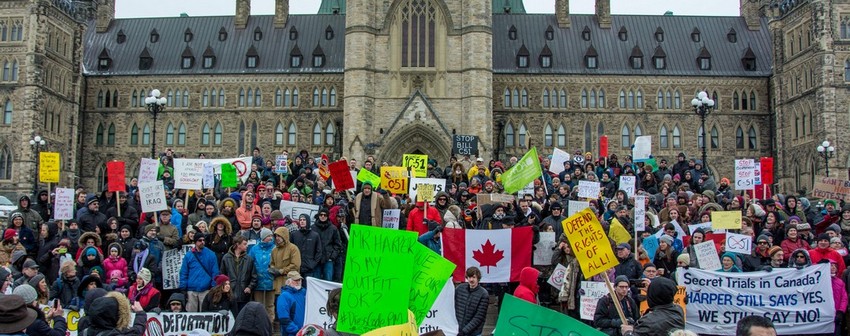
Just over one year ago on January 30, 2015 the Harper government introduced Bill C-51, legislation which sanctions black ops and state terror against Canadians as well as other peoples abroad. The bill was acknowledged by broad sections of Canadian society, from workers, Indigenous peoples, intellectuals and experts as being in contempt of the rule of law. It generated broad discussion among all sections of the people as to its meaning and what could be done.
These questions were answered and Canadians, Quebeckers and Indigenous peoples showed what they are made of by calling for the defence of rights, not state terrorism as the way to ensure our safety and security. This included mass protests in more than 70 cities and hundreds of thousands of people signing petitions to defeat and then repeal the bill.
Bill C-51 had its final vote in the House of Commons May 6, 2015 and was adopted by a vote of 183 to 96, with Conservative and Liberal MPs voting in favour and NDP, Bloc Québécois, Green Party and Forces et démocratie MPs voting against.
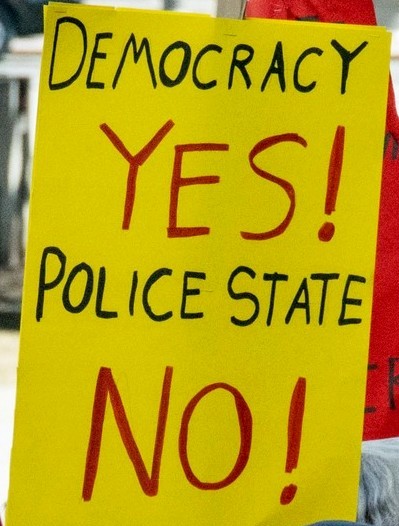 The new Liberal government says it will not repeal the bill despite the people’s demands. Its defence of secret police powers, privilege and impunity does not bode well. The very suggestion that rights can be defended by police powers which are outside the rule of law is not only preposterous, it is irrational. The Liberals assure us they will create a parliamentary oversight committee and are studying the British example. This too is preposterous and irrational. How can the British be a model for a government of law when it comes to the use of police powers?
The new Liberal government says it will not repeal the bill despite the people’s demands. Its defence of secret police powers, privilege and impunity does not bode well. The very suggestion that rights can be defended by police powers which are outside the rule of law is not only preposterous, it is irrational. The Liberals assure us they will create a parliamentary oversight committee and are studying the British example. This too is preposterous and irrational. How can the British be a model for a government of law when it comes to the use of police powers?
Since colonial times the British were past masters at the use of secret police in defence of the Raj at which time they defined rights on the basis of the imperial policy of divide and rule. They then joined forces with the Tsarist police in assassinating the enemies of absolutism and were the architects of the world’s darkest dungeons, including the concentration and torture camps in Rhodesia and South Africa, Ireland and Greece and then Ireland again. The treatment of Irish political prisoners is not a thing of the past but the present. If the Liberal government wants to learn from the British when it comes to “balancing security and rights,” then why not have an open discussion amongst Canadians of what precisely this means?
Like French President François Hollande, the Liberals are inventing the means to de facto change the Constitution so that the police powers which are outside the government of laws are made part of the government of laws. However, to legitimize arbitrariness goes against everything a government of laws stands for. While it is quite possible to pass new laws which criminalize dissent, how does one legitimize arbitrariness or call arbitrariness rule of law?
Renewal Update urges Canadians to continue to be very active in the defence of rights, demanding the repeal of Bill C-51 and for the rights of Canadians to be upheld. Hold the government to account!
The Importance of Being Progressive
 The Liberals always claim to be progressive and appeal for support on this basis. During the federal election campaign Justin Trudeau said “the most progressive platform is the Liberal platform.” Large, corporate-funded think tanks which promote Liberal policy describe themselves as progressive, such as Canada 2020 which calls itself “Canada’s leading, independent, progressive think-tank.”
The Liberals always claim to be progressive and appeal for support on this basis. During the federal election campaign Justin Trudeau said “the most progressive platform is the Liberal platform.” Large, corporate-funded think tanks which promote Liberal policy describe themselves as progressive, such as Canada 2020 which calls itself “Canada’s leading, independent, progressive think-tank.”
Canada 2020 is sponsored by no less than Air Canada, Rio Tinto and CN — in other words, some of the most virulently anti-worker monopolies in Canada — as well as the Canadian Association of Petroleum Producers, CIBC, Enbridge, GE, Google, Facebook, Suncor, TD, Telus and a number of others. All are companies which speak and act with one voice for a neo-liberal direction for the economy and against the rights of the working people and democratic renewal. And they are supposed to have an interest in “progressive policy.”
What does it mean to be progressive? What is the criteria?
Renewal Update thinks that nobody should go along with what anyone calls themselves but look at what they do. Something is progressive if it stands for progress against retrogression. At the very least a progressive should play a role in addressing real problems of life and contribute to providing them with solutions. A progressive should assist the workers and people to empower themselves and sort out the problems facing humanity. She or he should assist in dealing with the pressing need to humanize the natural and social environment and enforce peaceful relations within and between countries, not on the basis of the use of force, police powers, black ops, concentration and torture camps, targeted assassinations, sting operations and defamation but by putting the well-being of human beings, not monopoly interests, at the centre stage of decision-making. A progressive contribution should help to create a power which can provide the rights of the people with a guarantee. Only if such criteria are met can someone or something be called progressive.
The importance of providing ourselves with the criteria required to call oneself progressive cannot be overestimated if one is to hold the government to account.
This issue of Renewal Update provides information for readers on issues pertaining to the secret police powers and questions of war and peace which will help them evaluate the Liberals’ claims to be progressive.
Liberal Government’s Proposals for Security Legislation
Prime Minister Trudeau, in his Mandate Letter to the Minister of Public Safety and Emergency Preparedness Ralph Goodale, named as a top priority “to repeal… the problematic elements of Bill C-51 and introduce new legislation that strengthens accountability with respect to national security and better balances collective security with rights and freedoms.”
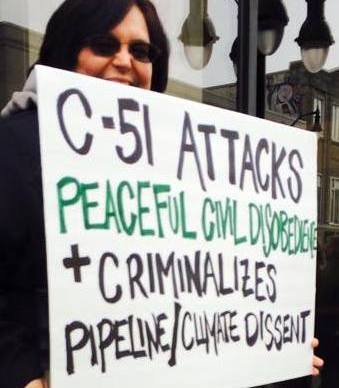 The Mandate Letter to the Leader of the Government in the House of Commons Dominic LeBlanc calls for “the creation of a statutory committee of Parliamentarians with special access to classified information to review government departments and agencies with national security responsibilities.”
The Mandate Letter to the Leader of the Government in the House of Commons Dominic LeBlanc calls for “the creation of a statutory committee of Parliamentarians with special access to classified information to review government departments and agencies with national security responsibilities.”
Trudeau announced on January 8 that David McGuinty, Member of Parliament for Ottawa South, will be taking a leadership role in the proposed statutory committee of Parliamentarians that will be responsible for reviewing security-related issues. The Prime Minister’s Office said that the proposal for such a committee will be brought forward “in the coming months” and that the committee will be “instrumental in helping the government meet its stated goal of strengthening national security oversight.”
Goodale and McGuinty traveled to London, England on January 11 and 12 to meet with representatives of the Intelligence and Security Committee of the British Parliament (ISC). Scott Bardsley, spokesperson for Goodale told iPolitics, “[ISC is] well-regarded internationally, making it a good model to study as we design the structure of a Canadian committee. It has never leaked — an important consideration for a committee that will have special access to classified information on national security.”
Goodale told the CBC that the government will be following the examples of the UK, U.S., Australia and New Zealand — the other members of the U.S.-led Five Eyes spying network — “to make sure Canada has this kind of review mechanism in place to ensure we’re being effective in keeping Canadians safe, and at the same time protecting rights and values.”
No timelines have been given by the government for when it will bring forward amendments to Bill C-51 or other security legislation, nor has the government said what aspects of Bill C-51 would be amended. Goodale told media in January that the government would hold consultations on the issue of national security legislation as it has done in a number of areas.
Vancouver, February 9 — 48th Weekly Picket to
Repeal Bill C-51
 Tuesday, February 9 — 4:00 pm
Tuesday, February 9 — 4:00 pm
New Westminster Skytrain Station
No to Terrorism!
No to Racism! No to Islamophobia!
Our Security Lies in Defending the Rights of All!
For over one year now, people across Canada as well as major human rights, legal, media and civil liberties organizations have made their voice clear, “REPEAL BILL C-51 NOW!” Already over 311,000 people have signed an online petition demanding the repeal of Bill C-51, making it one of the most popular petitions ever in the history of Canada.
As the pressure on the Liberal government increases regarding Bill C-51, it continues to be important to demonstrate loudly and clearly that we will not accept even an amended attack on our democratic and human rights. The Working Group to Stop Bill C-51 has organized 47 consecutive weekly pickets against Bill C-51, and we invite you to our 48th. We need to continue to educate, organize and mobilize to demand the immediate repeal of Bill C-51!
Organized by Working Group to Stop Bill C-51
For Information: Facebook e-mail: stoppolicestatebillc51@gmail.com
Government Defends Secret Police Privilege in
Torture Lawsuit
The Liberal government is continuing the previous government’s legal fight against an apology and compensation for Canadian victims of torture who were defamed as terrorists by the Canadian Security Intelligence Agency (CSIS), the Toronto Star reported on February 6.
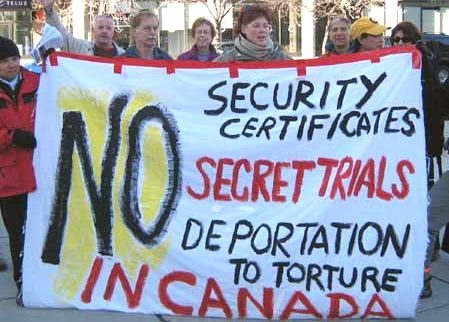 An inquiry conducted in secret by retired Supreme Court Justice Frank Iacobucci, that released its report in October 2008, found that the actions of Canadian officials contributed to the detention and torture of Abdullah Almalki, Muayyed Nureddin and Ahmad El Maati in Syria between 2000 and 2003. The House of Commons adopted a motion in 2008, with the support of the Liberals, calling for an apology and compensation for the victims.
An inquiry conducted in secret by retired Supreme Court Justice Frank Iacobucci, that released its report in October 2008, found that the actions of Canadian officials contributed to the detention and torture of Abdullah Almalki, Muayyed Nureddin and Ahmad El Maati in Syria between 2000 and 2003. The House of Commons adopted a motion in 2008, with the support of the Liberals, calling for an apology and compensation for the victims.
The Star states that “in aggressively defending the actions of CSIS and trying to prevent the release of thousands of unredacted documents that a judge is now poring over, the Liberals are going further than their Conservative predecessors did to protect CSIS sources.”
Lawyers for the federal government are seeking “retroactive blanket anonymity for spies and their sources” and have filed an appeal in a civil lawsuit launched by three victims of torture in the Federal Court. Phil Tunley, a lawyer for the victims, told the Star that the move is “a continuation of this incredibly litigious no-holds-barred scorched-earth defence strategy which we’ve been experiencing for 10 years under the Harper government.”
Bill C-44, the Protection of Canada from Terrorists Act, adopted last year (with Liberal support, like Bill C-51), extended “source privilege” to all CSIS assets, prohibiting disclosure of their identities. Justice Richard Mosley of the Federal Court had ruled that the federal government’s claim that C-44 should apply retroactively “creates a new privilege” and would infringe on the victims’ rights. The Liberals are appealing this ruling.
“If you remove the courts from the oversight of CSIS management of its human sources and you basically say no court can ever look behind and see whether a source really is a confidential source or if they’re telling the truth … there’s no accountability in the courts,” Phil Tunley said. “It’s an extraordinarily draconian measure.”
Ongoing Court Case Over RCMP/CSIS Sting Operation
The ongoing court case involving John Nuttall and Amanda Korody, both found guilty in June 2015 of conspiracy to commit murder and making or possessing an explosive device, demonstrates the dangers of state security agencies acting with impunity and their role in manufacturing terror plots.[1] Nuttall and Korody have not yet been sentenced as there is an ongoing defence application to have charges stayed on the basis that they were set up in an RCMP and Canadian Security Intelligence Service (CSIS) sting.
Nuttall and Korody were targets of a months-long RCMP sting operation called Project Souvenir, which involved 240 law enforcement officers. B.C. Supreme Court Justice Catherine Bruce on January 6 ordered CSIS to produce all records concerning a person referred to only as X, said to be a CSIS agent. Daniel Bond, an RCMP liaison with CSIS testified on January 20 that Nuttal was targeted by CSIS in 2012 and had an “investigative technique engaged” when they directed the RCMP towards him in early 2013. Heavily redacted court documents say the CSIS agent played a large role in “radicalizing” Nuttall.
Hearings were suspended February 5 and the reason for this was subject to a publication ban.
On February 2, Justice Bruce noted that CSIS had refused to comply with her order to produce records, which she called a “great concern.” Donnaree Nygard, a lawyer for CSIS, told the judge that Attorney General of Canada Jody Wilson-Raybould will decide whether or not to disclose the materials, which could take days or weeks.
Writing for the Vancouver Sun, Ian Mulgrew reports that the federal government wants the issue “resolved privately with only a vetted transcript being made available later.” While in 2012 “Surrey RCMP dealt with Nuttall as a nuisance with mental health issues,” Mulgrew writes, by 2013 “he had somehow become a serious threat to national security requiring expensive CSIS and RCMP operations.” The RCMP liaison Bond was told, “Work the file hard.”
“When you consider some RCMP officers didn’t think Nuttall had the capacity or the resources to pose a serious concern, how did he become an “imminent threat” and why were all these resources deployed and expended?” writes Mulgrew. “That is what the government is really trying to keep the public from hearing and why it is trying to bring down a national security curtain on this trial.”
Testimony from Dr. Omid Safi, Director of Islamic Studies at Duke University, pointed to the fact that police handlers went out of their way to convince Nuttall to believe their own version of Islam and dissuade him from reaching out to Imams. Nuttall repeatedly expressed doubts and reservations about the idea of killing innocent people but undercover police insisted that he keep mum about his misgivings.
Note
1. Before being targeted by the RCMP and CSIS, Nuttall and Korody were drug addicts living hand-to-mouth in Surrey, BC. They were arrested on July 1, 2013 amidst claims that police had foiled a plot to bomb the BC Legislature on Canada Day. Evidence at their initial trial, which lasted from 2013 to 2015, suggested that the couple were pushed at every step of the way by police handlers to produce and carry out the “plot” including providing them with the specifics of the “bombs.”
(Global News, The Province)
Of Interest
Coast Guard Communications Officers Call for Improved Marine Safety
Coast Guard Marine Communications Officers, members of Unifor Local 2182, along with the coastal communities they serve are asking that their concerns about the closure of important marine safety infrastructure be taken seriously and not dismissed by the government with “non-answer answers.” They are calling on the government not to close any more Marine Communications and Traffic Services (MCTS) centres and follow through on the Liberal election promise to reopen centres closed under the previous government.
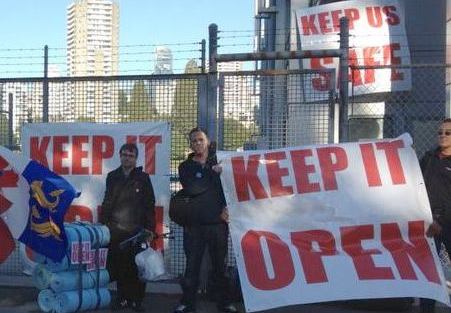
Protest against the Harper government’s closing of the Kitsilano Coast Guard Station, September 15, 2012.
Hunter Tootoo, Minister of Fisheries, Oceans and the Canadian Coast Guard, was questioned in the House of Commons on January 29 about the status of MCTS centres in Comox and Tofino on Vancouver Island. The Comox centre is slated for closure soon and the Tofino centre has already been closed.
The first question was asked by Rachel Blaney, MP for North Island-Powell River. Blaney said, “The Liberals promised to reopen marine communication centres in BC that were closed by the Conservatives, but the Comox Coast Guard traffic centre is set to close March 31, and the Liberals are still missing in action. The closure will put lives at risk in coastal communities. The government has a responsibility to keep Canadians safe. Will it commit today to keeping the Comox MCTS centre open?”
The Minister responded, “Marine safety is the top priority of the Canadian Coast Guard. Through modern technology, we have been able to ensure that no communication gaps will be in place and we will still maintain that safety.”
The second question was asked by Gord Johns, MP for Courtenay-Alberni: “The Conservative decision to close the Tofino MCTS centre in Ucluelet left coastal communities without protection. My community is still reeling from the sinking of the Leviathan II and the recent loss of lives. This tragedy underlined that having local eyes and ears is essential for coastal safety. The Liberals promised to restore the coast guard’s ability to respond to emergencies, so will they back this up by immediately reopening the Tofino marine communication centre?”
The Minister responded, “I would like to reiterate that the Canadian Coast Guard’s top priority is the safety of mariners, to make sure there is communication between vessels, and to monitor that safety is there. The technology we have included in the new system guarantees that safety, and it will always be there.”
Rachel Blaney, MP for North Island–Powell River has sponsored House of Commons petition e-53 that calls on the Minister of Fisheries, Oceans and the Canadian Coast Guard to:
1. Stop the closure of the Coast Guard Marine Communications and Traffic Services Centre in Comox, BC;
2. Review the closures of the other nine MCTS Centres that have occurred since 2012; and
3. Reopen Centres where practicable.
To sign the petition, click here.
The Government’s Treatment of Important Questions of War and Peace
Canadians are concerned about questions of war and peace and want Canada to be a force for peace in the world. During the 2015 federal election the Liberal Party suggested that it stood for peace, would end Canada’s combat mission in Iraq and would not continue on the aggressive path of the previous government. Since coming to power the Liberals have shown that in the name of peace they, like the Harper government, stand for war and are charting a dangerous course for Canada’s foreign policy.
TML Weekly reports that contrary to the promise to end Canada’s combat mission, the government is set to step up the presence of Canadian soldiers in the Middle East and its combat role. The government is continuing the dangerous course of embroiling soldiers in the dirty war in Ukraine and following the lead of the U.S. in interfering in the affairs of Syria, Haiti and Latin America.
In November 2015, the Prime Minister’s Office appointed Roland Paris as one of five top advisors to Prime Minister Trudeau. Paris is an academic and involved with think tanks advancing a warmongering foreign policy for Canada. He is reported to be “the man behind Justin Trudeau’s foreign policy.” A concern for Canadians is Paris’ foreign policy preoccupations, which include increasing military spending and increasing Canada’s role in the aggressive NATO military bloc.
Renewal Update encourages everyone to read and share TML Weekly to stay informed about these developments and the important matter of the need for Canada to be a force for peace in the world. To read the latest issue, Click here.

